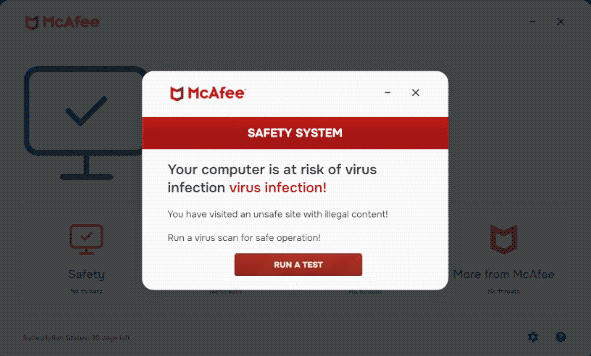“McAfee – Computer Is At Risk Of Virus Infection” is a fake virus alert that claims your computer is at risk of being infected with a virus. This specific fake alert is trying to make money from McAfee’s affiliate program by falsely claiming users’ computers are infected and then directing them to a McAfee anti-virus page. McAfee is not related to this scam, its affiliates’ program is merely misused by malicious actors. If you see this pop-up, you can just close it.
The “McAfee – Computer Is At Risk Of Virus Infection” pop-up scam claims that your computer may become infected with viruses because you have visited unsafe websites that have illegal content. The pop-up alert asks that you run a scan by clicking the “Run a test” button. If you click the button, you will be shown a fake virus scan and then informed that your computer is infected with 5 infections. The alert then recommends that you buy a McAfee subscription, and redirects you to the official McAfee site. While the fake virus alert advertises a legitimate anti-virus program, scammers are using deceptive tactics in order to make money from McAfee’s affiliate program. Thus, even if McAfee is a good anti-virus program, you should not buy a subscription if you are redirected to its site via fake virus alerts.
McAfee
SAFETY SYSTEM
Your computer is at risk of virus infection virus infection!
You have visited an unsafe site with illegal content!
Run a virus scan for safe operation!
RUN A TEST
It should be mentioned that any virus alert you see in your browser is a scam. Browsers do not have the capability to detect malware, so legitimate virus warnings will never be displayed. Only trust your anti-virus software to provide accurate information regarding malware on your computer.
Fake virus alerts are widespread, but they are harmless as long as you don’t engage with them. Some alerts may trick you into downloading malicious software, while others might prompt you to call fake tech support numbers. This type of scam is known as a tech support scam. If you call the displayed number, you’ll likely be connected to scammers posing as legitimate tech support representatives from companies like Windows or Apple.
If you encounter scams like these, it’s best to simply ignore them. Installing an adblocker program can help. Using an adblocker is particularly important when visiting high-risk websites, as they often lead to random redirects. We also recommend running a scan with an anti-virus program to check for an adware infection.
What triggers redirects to these scams
In certain instances, users may find themselves redirected to scam websites due to an adware infection on their devices. However, more commonly, these redirects occur when users visit certain sites without an adblocker installed on their devices. Some websites are regarded as high-risk due to the intrusive ads they show users. For instance, sites featuring pornographic or pirated content often bombard visitors with numerous ads, leading to frequent redirects. Thankfully, any decent adblocker program can effectively block these ads and redirects.
Although less often, random redirects can also indicate an adware infection—especially if they happen while browsing secure sites. Adware infections typically spread through a method called software bundling. This technique allows unwanted software to be added to popular free programs as additional offers, which can be installed without explicit permission. This method is often controversial, and programs that use it are frequently flagged as potential threats by anti-virus software.
While all additional offers are technically optional, users need to proactively uncheck them during installation to avoid unwanted programs. These offers often remain hidden initially, making them easy to overlook. To properly install a program, it’s best to select Advanced (Custom) settings instead of the recommended Default settings. Using Default settings will lead to all additional offers being automatically installed. In contrast, the Advanced settings will clearly list these offers, giving you the option to uncheck them. It’s advisable to deselect all offers, as they typically provide no real benefit. Legitimate software should not rely on software bundling for installation. Allowing these unnecessary installations can clutter your computer with unwanted junk programs, which can also be difficult to remove.
Remove “McAfee – Computer Is At Risk Of Virus Infection” fake virus alert
If you get redirected to a site displaying this fake virus alert, you can simply close the tab/window. Pay no attention to the contents of the alert because it’s fake. Certainly do not engage with it and buy the offered anti-virus subscription because that will generate money for scammers.
However, it is a good idea to scan your computer with anti-virus software because the redirects may be a symptom of an adware infection. Removing adware is easiest using anti-virus software because it can be a rather persistent infection. Do not forget to install an adblocker program as well to block intrusive ads and redirects, especially when you’re browsing high-risk sites.
Site Disclaimer
2-remove-virus.com is not sponsored, owned, affiliated, or linked to malware developers or distributors that are referenced in this article. The article does not promote or endorse any type of malware. We aim at providing useful information that will help computer users to detect and eliminate the unwanted malicious programs from their computers. This can be done manually by following the instructions presented in the article or automatically by implementing the suggested anti-malware tools.
The article is only meant to be used for educational purposes. If you follow the instructions given in the article, you agree to be contracted by the disclaimer. We do not guarantee that the artcile will present you with a solution that removes the malign threats completely. Malware changes constantly, which is why, in some cases, it may be difficult to clean the computer fully by using only the manual removal instructions.
